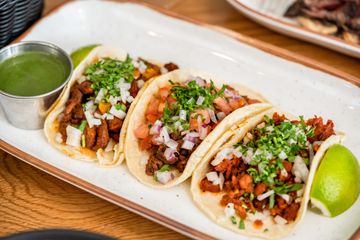Is Mexican Food Healthy And Balanced? Unboxing the Nutritional Advantages of Typical Ingredients
The concern of whether Mexican food is healthy welcomes an expedition of its conventional active ingredients. Beans and corn function as foundational staples, abundant in protein and fiber. Avocados offer helpful fats, while different natural herbs and spices add flavor and wellness benefits - mexican food. With each other, these components develop a tapestry of nutrition. However, the healthfulness of Mexican cuisine typically relies on preparation techniques and section sizes. What duty do these factors play in identifying its total nutritional value?
The Power of Beans: Healthy Protein and Fiber-Rich Staples
Frequently ignored, beans offer as a cornerstone of Mexican food, providing a wide range of nutritional advantages. Rich in protein, they are an outstanding plant-based option for those looking for to satisfy their nutritional protein needs. This high healthy protein material sustains muscle mass repair service and development, making beans very useful for both vegetarians and meat-eaters alike. Additionally, beans are an outstanding resource of nutritional fiber, which helps in food digestion and promotes a feeling of fullness, potentially aiding with weight management.
The variety of beans used in Mexican recipes, such as black beans, pinto beans, and kidney beans, adds to a diverse taste account and can enhance meals nutritionally. Beans are reduced in fat and contain essential vitamins and minerals, including magnesium, iron, and folate. With each other, these attributes make beans an essential ingredient, delivering both nourishment and sustenance in standard Mexican fare.

Corn: a Versatile Grain With Nutritional Benefits
Corn sticks out as a flexible grain basic to Mexican cuisine, celebrated not just for its culinary applications however additionally for its excellent nutritional profile. As a main active ingredient in meals like tortillas, tamales, and pozole, corn gives important nutrients that add to a well balanced diet regimen. Rich in carbohydrates, it works as a substantial energy source, while also being low in fat, making it a desirable option for different nutritional demands.
Corn is a great resource of dietary fiber, which assists in food digestion and advertises satiation. It consists of significant quantities of vitamins such as B-complex vitamins, which are important for basal metabolism. The visibility of anti-oxidants, particularly carotenoids, contributes to overall health and wellness by decreasing oxidative stress and anxiety. Additionally, corn is gluten-free, accommodating those with gluten level of sensitivities. In general, the dietary benefits of corn highlight its importance in conventional Mexican food and its function in a healthy and balanced diet.
Avocados: Healthy Fats and Nutrients in Every Bite
Avocados play a substantial role in Mexican cuisine, complementing dishes with their velvety appearance and abundant taste. Past their cooking appeal, avocados are commemorated for their remarkable nutritional profile. They are a rich resource of healthy and balanced monounsaturated fats, which can assist lower bad cholesterol levels and assistance heart wellness. Additionally, avocados are packed with important minerals and vitamins, including potassium, vitamin E, and B vitamins, adding to total health.
The high fiber material in avocados aids digestion and advertises satiation, making them a valuable addition to any kind of meal. Their one-of-a-kind nutrient composition can additionally support skin wellness and provide anti-inflammatory benefits. Incorporating avocados right into standard Mexican dishes or appreciating them as a standalone snack can improve both taste and nourishment, showing why they are a precious staple in Mexican food. On the whole, avocados supply a scrumptious means to enjoy healthy fats and crucial nutrients in every bite.

Herbs and flavors: Flavorful Wellness Boosters
While delighting in the abundant tastes of Mexican cuisine, one can not ignore the important duty that spices and herbs play in improving both preference and wellness. Ingredients such as oregano, cilantro, and chili peppers not just add to the dynamic taste account yet also offer considerable wellness advantages. Cilantro is understood for its detoxifying homes, aiding to eliminate hefty metals from the body, while oregano is packed with antioxidants and possesses anti-inflammatory effects.
Chili peppers, a staple in many Mexican dishes, include capsaicin, which has been linked to enhanced metabolic process and pain relief. Furthermore, seasonings like cumin and coriander assistance food digestion and might aid in blood sugar guideline. Including these flavorful wellness boosters right into meals not only improves the cooking experience yet also advertises overall wellness, making Mexican cuisine not just scrumptious, but likewise nutritionally useful.
Traditional Cooking Approaches: Enhancing Nourishment and Flavor
Conventional food preparation approaches in Mexican food play an essential role in enhancing both nourishment and flavor, as they often prioritize fresh active ingredients and classic methods. Strategies such as nixtamalization, where corn is soaked and cooked in an alkaline solution, not only improve the nutrient profile of tortillas but additionally improve their digestibility - take out and delivery. Furthermore, using slow-moving cooking approaches, like cooking or braising, enables tastes to fuse wonderfully while maintaining the honesty of the components

Often Asked Questions
Are Mexican Food Portions Typically Larger Than Other Foods?
Mexican food portions are usually bigger than those of numerous various other foods. This click for more characteristic reflects typical eating techniques, highlighting common sharing and hearty dishes, which can result in a more significant serving size overall.
Just how Does the Prep Work Approach Affect Healthfulness of Mexican Food?
Prep work techniques considerably influence the healthfulness of Mexican food. Techniques such as cooking or steaming preserve nutrients, while frying can raise undesirable fat content. Choices of components and cooking styles eventually determine general dietary value.
Can Mexican Food Be Customized for Details Dietary Constraints?
Mexican food can certainly be customized for specific nutritional constraints. Alternatives, such as making use of corn tortillas for gluten-free diets or including more vegetables, make it possible for individuals to take pleasure in view website traditional flavors while fitting numerous dietary needs.
What Are Typical Misunderstandings Concerning Mexican Food and Health?
Typical false impressions about Mexican food include the idea that it is naturally unhealthy, excessively hot, and solely concentrated on fats. In truth, traditional dishes often feature nutritious components and can be customized to numerous dietary needs.
Are There Healthier Choices at Mexican Dining Establishments?
Much healthier options at Mexican restaurants frequently include grilled meats, beans, and fresh vegetables. Choosing recipes that stress entire ingredients and avoiding heavy sauces can result in a much more healthy dining experience, promoting overall well-being.
The variety of beans used in Mexican recipes, such as black beans, pinto beans, and kidney beans, adds to a varied taste profile and can boost meals nutritionally. Avocados play a substantial function in Mexican cuisine, matching recipes with their velvety appearance and abundant taste. Incorporating avocados into typical Mexican dishes or appreciating them as a standalone snack can improve both taste and nutrition, demonstrating why they are a precious staple in Mexican cuisine. While taking pleasure in the abundant tastes of Mexican cuisine, one can not overlook the necessary function that spices and natural herbs play in boosting both preference and health and wellness. Standard cooking methods in Mexican cuisine play an essential duty her explanation in improving both nutrition and taste, as they commonly prioritize fresh ingredients and classic techniques.